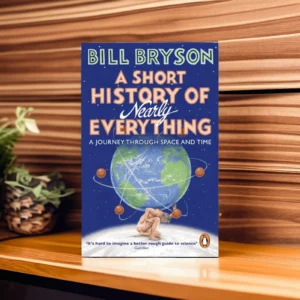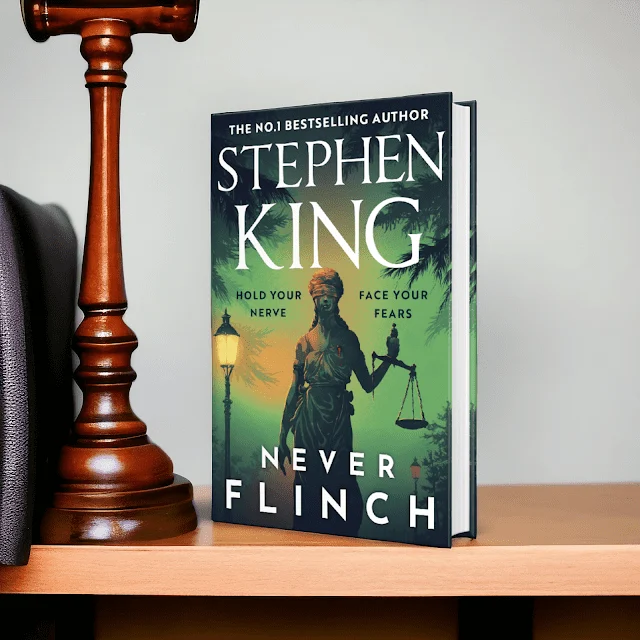🌟 Introduction: The Science Book That Will Change How You See the World
Have you ever wondered how the universe came to be? How life began? Or why scientists believe the things they do? If so, A Short History of Nearly Everything by Bill Bryson is the perfect book for you.
Unlike traditional science textbooks that can be dry and overwhelming, Bryson takes readers on an exciting journey through the greatest discoveries in history—from the Big Bang to quantum physics, evolution, geology, and the mysteries of the human body.
What makes this book truly special is Bryson’s ability to simplify complex scientific ideas while keeping them engaging, humorous, and relatable. Whether you’re a science enthusiast or someone who has always found science intimidating, this book will forever change how you see the world.

📖 What Is A Short History of Nearly Everything About?
🔬 Exploring the Biggest Questions in Science
Bryson’s mission in this book is clear: to make science accessible and exciting for everyone. Instead of bombarding readers with technical jargon, he tells captivating stories of the brilliant minds and accidental discoveries that shaped our understanding of the universe.
Here are some of the key topics covered in the book:
✅ The Origin of the Universe 🌌 – How did the Big Bang happen? What existed before it?
✅ The Birth of Earth 🌍 – How did our planet form? What makes it unique in the cosmos?
✅ The Evolution of Life 🦖 – How did life emerge from simple molecules? What led to dinosaurs, and eventually, humans?
✅ The Science of Atoms ⚛️ – What are we made of? How do atoms function?
✅ The Mysteries of the Deep Ocean 🌊 – Why do we know more about space than the depths of our own oceans?
✅ The Threat of Natural Disasters 🌋 – Could an asteroid wipe us out? What triggers earthquakes and volcanic eruptions?
✅ The Human Body 🧬 – Why is our existence such a miraculous product of evolution?
Bryson doesn’t just present scientific facts—he brings them to life through fascinating, often hilarious stories about the eccentric, brilliant, and sometimes downright bizarre scientists behind these discoveries.
🧐 What Can You Learn from This Book?
🔍 Why A Short History of Nearly Everything Is So Valuable
This book is more than just a science lesson—it’s an eye-opening experience that makes the wonders of the universe exciting and meaningful.
✔️ It Makes Science Fun & Easy to Understand – Bryson explains even the most complex ideas in a simple, engaging way.
✔️ It Sparks Curiosity About the Universe – Every chapter leaves you in awe of existence itself.
✔️ It Tells the Human Side of Science – Learn about the struggles, rivalries, and mistakes of history’s greatest scientists.
✔️ It Challenges What You Think You Know – Many scientific “facts” we take for granted were discovered by accident.
✔️ It Covers a Vast Range of Topics – Whether you love physics, biology, chemistry, or history, this book has something for you.
🛠 Why Is This Book So Effective?
Unlike traditional science books, Bryson uses storytelling, humor, and relatable examples to bring scientific concepts to life.
For example:
❌ Traditional Explanation of Atoms: “Atoms are the basic units of matter, composed of protons, neutrons, and electrons.”
✅ Bryson’s Explanation of Atoms: “Every atom in your body has been around since the dawn of time. You might be carrying a few that once belonged to Shakespeare—or a dinosaur!”
This engaging, conversational approach makes the book not just educational but also fun to read.
📚 Who Is Bill Bryson? How Popular Is A Short History of Nearly Everything?
🖊 About the Author: Bill Bryson
✔️ Who Is He? A bestselling American-British author known for his witty and insightful books on science, history, and travel.
✔️ His Mission: To make science, language, and history accessible, entertaining, and deeply fascinating.
✔️ Other Famous Books: The Body: A Guide for Occupants, Notes from a Small Island, The Mother Tongue.
📊 Sales & Global Influence
📌 First Published: 2003
📌 Estimated Copies Sold: Over 2 million copies
📌 Languages Translated: Over 40 languages
📌 Who Reads It? Students, teachers, science lovers, and anyone curious about the world.
It is widely regarded as one of the best science books ever written for the general public.
🔍 How Does A Short History of Nearly Everything Compare to Other Science Books?
Bill Bryson’s masterpiece stands out among science books, but how does it compare to other popular titles? Below is a detailed comparison based on readability, entertainment value, depth of information, and accessibility.
📊 Comparison Table: Top Popular Science Books
A Short History of Nearly Everything – Bill Bryson
- 🎯 Best For: Curious beginners who love engaging storytelling
- 🤹 Entertainment: Excellent
- 🧠 Depth of Information: Outstanding
- 🏆 Accessibility: Very Easy
- 🌍 Scope of Topics: Covers a vast range of sciences
Astrophysics for People in a Hurry – Neil deGrasse Tyson
- 🎯 Best For: Space lovers who want a quick but insightful read
- 🤹 Entertainment: Good
- 🧠 Depth of Information: Very Good
- 🏆 Accessibility: Easy
- 🚀 Scope of Topics: Focuses mainly on astrophysics
Sapiens: A Brief History of Humankind – Yuval Noah Harari
- 🎯 Best For: History & anthropology enthusiasts
- 🤹 Entertainment: Very Good
- 🧠 Depth of Information: Very Good
- 🏆 Accessibility: Easy
- 🏛️ Scope of Topics: Focuses more on human evolution
The Selfish Gene – Richard Dawkins
- 🎯 Best For: Those interested in genetics & evolution
- 🤹 Entertainment: Good
- 🧠 Depth of Information: Outstanding
- 🏆 Accessibility: Moderate
- 🧬 Scope of Topics: Deep dive into evolution
Cosmos – Carl Sagan
- 🎯 Best For: Those who enjoy poetic and inspiring science
- 🤹 Entertainment: Very Good
- 🧠 Depth of Information: Very Good
- 🏆 Accessibility: Easy
- 🌌 Scope of Topics: Space, physics, and philosophy
Key Highlights:
- 🌍 Broadest Scope: A Short History of Nearly Everything
- 🚀 Best for Space Lovers: Astrophysics for People in a Hurry
- 🏛️ Best for Human History: Sapiens
- 🧬 Best for Evolution: The Selfish Gene
- 🌌 Most Inspiring: Cosmos
✅ Which One Should You Read?
If you’re looking for a fun, easy-to-read, and incredibly insightful introduction to the wonders of science, A Short History of Nearly Everything is the best choice. It balances storytelling with scientific facts, making it an enjoyable read for both science lovers and newcomers alike.
However:
- If you love space & astrophysics, Astrophysics for People in a Hurry might be a better fit.
- If you’re interested in human evolution, Sapiens provides a broader historical perspective.
- If you want a deep dive into genetics, The Selfish Gene is a groundbreaking book.
- If you prefer a poetic and philosophical approach to science, Cosmos is a timeless classic.
📌 Bottom Line: If you want a book that makes science fun, accessible, and exciting, A Short History of Nearly Everything is the perfect choice! 🚀📖
💡 Why You Should Read A Short History of Nearly Everything
If you want to:
✔️ Understand the biggest mysteries of the universe, life, and science
✔️ Learn about history’s greatest discoveries in a fun and engaging way
✔️ Appreciate how much scientists struggled to uncover the truth
✔️ Be amazed by the wonders of existence
✔️ Laugh while learning about science
Then this book is a must-read.
📢 My Final Tip:
✅ Even if you think you don’t like science, read this book. It will make you fall in love with learning all over again!










